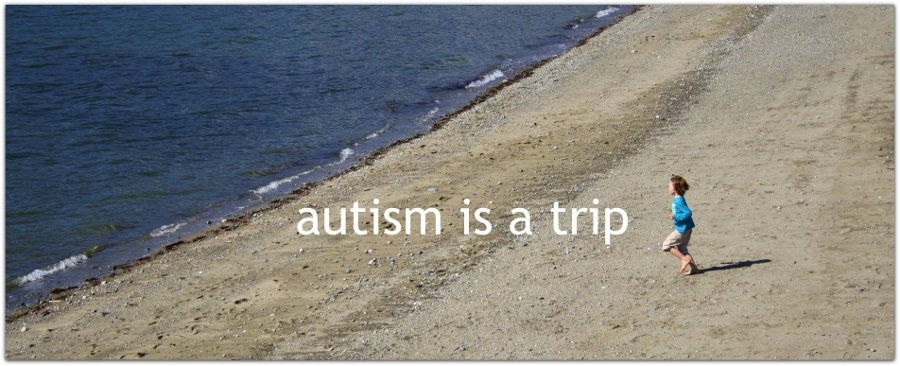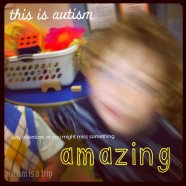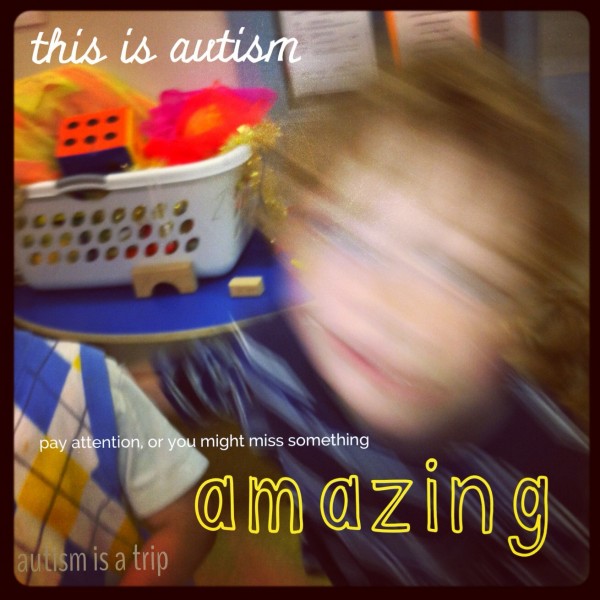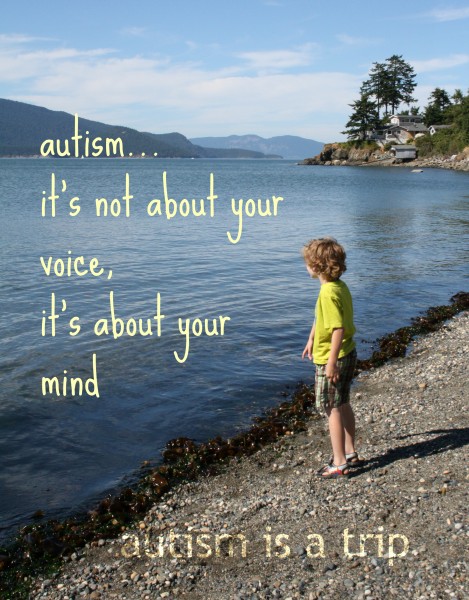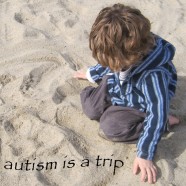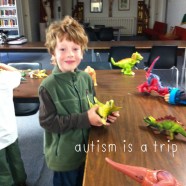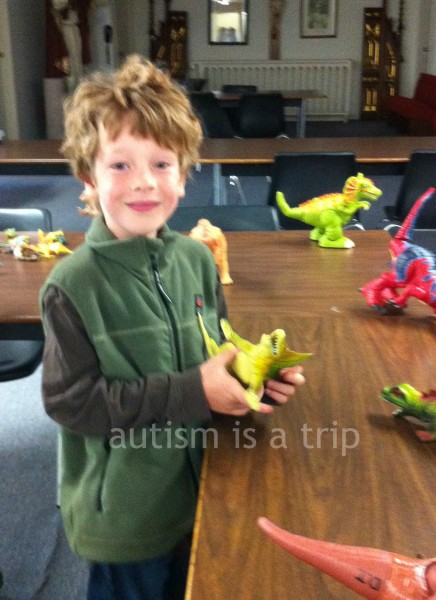Be A Friend: What to Do When A Child You Know is Diagnosed
Among family and those I consider close friends (people I have real, off-the-computer relationships with), more than thirty of their children are either on the autism spectrum, suspected of being on it, or have associated behaviours (ADHD, etc). In the last month alone, two dear friends have had a child diagnosed with autism.
Autism is everywhere, and that’s all right. Learning a child actually has autism, however, can be quite a shock.
We suspected Jack had at least a sensory processing disorder, and were actually hoping for an official autism diagnosis. With a diagnosis comes support and interventions.
When the psychiatrist at his evaluation actually suggested autism, though, it was an ice cold smack in the face.
Sometimes, even when you know your child is autistic, it hurts to hear it out loud.
Hearing the words, seeing the actual reports and assessments in your hands… somehow changes the game. You’re no longer on the sidelines, rather, you’re suddenly center field with the ball in your hands. Game on.
So now what?
As the saying goes, there is no rest for the weary. Parents of a newly diagnosed child are suddenly inundated with action plans, financial concerns, and their own, often conflicted, emotions.
And people who want to help. Lots and lots of well-intentioned people.
Parents of autistics are often overwhelmed with good intentions that are not always constructive. Some actually hurt. I doubt most of these folks even realize what they’re doing.
So, I came up with a few suggestions.
Things you should not say or do to a parent with a newly diagnosed child:
1) Express sorrow and/or pity.
The child has not died, and has not been diagnosed with a terminal illness. Autism is a life-long condition, but it’s not a death sentence. Please don’t act as if it is. Sympathy is good, pity is not.
2) Immediately suggest a diet/test/protocol.
Every person with autism is different, and not all respond in the same manner to the same things. The family will likely explore all of their options to find out what will work best for their child.
3) Start forwarding them every single article/email/meme/book that mentions the word autism.
They have just entered this world, and need some time to adjust. Drowning them in autism stories only complicates the situation.
4) Ask what they think caused the child’s autism.
To date, nobody knows what causes autism. There are a multitude of theories, but no concrete evidence, anywhere. Some studies point to genetics, some point to environmental influences, but none have a conclusive answer. Parents do nothing to “cause” their child’s autism, and asking this question passively-aggressively implies they did.
5) Share horror stories.
This is similar to scaring a first-time mom with horrible birth stories. Yes, autistic children wander, are abused in schools, and are open to any number of other terrible things. Just as you shouldn’t talk about how many babies die in a particular form of childbirth to a pregnant mother, don’t start listing off every bad thing that has happened to every autistic child ever. Just don’t.
6) If you’re a parent of an autistic child yourself, don’t smother them with “assistance.”
When the family is ready, they’ll reach out. Think about when your child was first diagnosed, and how you felt. Treat them the same way you wanted to be treated.
Instead, here are some things you definitely can and should do for someone with a newly diagnosed child:
1) Offer words of support.
Instead of an “I’m sorry,” give love and friendship. An “I’m here for you” goes a long way.
2) Wait until you’re asked to give advice/suggestions/help.
Stand back, give them some room to breathe. If you let them know you’re there whenever needed, they’ll come to you. And if they don’t, that’s all right, too. Don’t be offended.
3) If you’re an autism parent (or autistic) yourself, wait until you’re asked to share stories.
I know it’s tempting to share your tales of success and failures in various areas, but there will be plenty of time for that down the line.
4) Stay positive.
But don’t pander. Parents don’t need to hear that “at least” it’s high functioning autism or that s/he can speak, or anything else that minimizes the situation. It’s condescending and unnecessary. Instead, compliment the child. The child is the same today as s/he was before the diagnosis.
5) Ask “how can I help?”
Parents new to autism need some time to process what’s happening with them and their child. Take them a meal, watch their other children for a bit, or simply ask to help with laundry or other household chores. A little gesture or respite goes a long way.
6) Be a friend.
This one should be self-explanatory. Be there when they need you. Lend an ear or a shoulder. Give unconditional love. Autism can be a very isolating thing for everyone involved – knowing there are people to turn to is immeasurable.
Support is the number one thing families of autistics want and need. In any way, large or small, it all helps.
A version of this post originally appeared on redOrbit blogs.
Share this: Twitter | StumbleUpon | Facebook | digg | reddit | eMail Read MoreRunning Man
When you think of autism, what’s the first image that pops into your mind?
(It’s ok, we’re not pc here.)
I’m guessing it’s something along the lines of a child flapping their hands wildly. Or spinning in circles. Or making strange, loud sounds.
In the autism community, we call these “stims.” When somebody is “stimming,” they’re seeking sensory input, or stimulation. Stimming comes in all kinds of forms, often as individual as the person doing it.
Jack likes to run. In the house, in a pattern.
We call it “doing laps.”
When Jack is running laps, he’s in his own world. He has a set pattern, which usually starts at the couch in the living room, takes him through the room into the kitchen, off the fridge (it used to be the sliding glass door, until we finally convinced him that it might hurt to accidentally go through it), down the hall into the front door, and back into the living room, landing with a bounce on the couch.
With barely a breath in between, he’s off again.
He does this for a while, and he’s pretty much in his head the entire time. Meaning, he’s not available for conversation. Or much else, really.
He’s off in autism land.
I finally asked Jack what he’s thinking when he’s running his laps, as I was a bit concerned that he might be doing it out of frustration or anxiety.
“When I run like that, I’m thinking happy thoughts,” he said. “Right now, I’m thinking about Rugrats.”
Ok, then. I pressed him to explain further.
“Sometimes I think happy thoughts, sometimes. I’m walking around, which could give me energy.”
Makes complete sense.
I asked him if he’s upset, or if he just does it.
“I just decide to think happy thoughts.”
I had a feeling that as much as I was gaining a little bit of insight into Jack’s habit, I was starting to annoy him. Still, I pressed on. What makes him happy? What comes to him while he’s doing laps?
“Can I keep that a secret? I don’t want to tell you that.”
Of course. A man needs his secrets. He’ll tell me in his own time.
“Maybe I shouldn’t have said that. Cause I didn’t want that conversation.”
Or not.
Share this: Twitter | StumbleUpon | Facebook | digg | reddit | eMail Read More
Guess What? I Have Autism!
“Hi! I’m Jack. I have autism.”
A sentence I wasn’t sure I was ready to hear. Yet, so pleased to see it exclaimed loudly and proudly.
Two weeks ago my husband David and I told Jack he has autism for the very first time. We’ve never hidden anything from him, we just wanted to wait until we were certain he’d be able to understand the gravity of it all to address it directly.
We discussed it for months in advance, tried to plan out what we wanted to say. And what we didn’t want to say. We decided to wait until the summer, so he would have time to adjust to his new reality unfettered by school stresses. We looked at books, we asked what others had told their children.
Summer came and we still waited. For the right time, the right place, the right… whatever. We finally decided to take him out to lunch alone, where we could have a conversation without his brothers drawing focus. It would be perfect.
And we all know the best laid plans always go according to, well, plan.
The days passed and still no discussion, no lunch date. Then one day we were all sitting around the kitchen table doing arts and crafts and what-have-you. I looked at David, he looked at me and shrugged. It just seemed like a good time.
“Jack, do you know what autism is?”
He wasn’t sure, so we expanded on some things he already knew: people have different likes and dislikes, people don’t all look the same, people think differently.
That’s been a recurring theme in our family for years. Whenever one of the children asks why someone is a certain way, or why somebody likes something they don’t, or any time something is not the same as what they know, we say it.
“People’s lives are different.”
We knew someday Jack (or his brothers) would realize that he’s not like most of the other kids, and we wanted him to know that different is not wrong. It’s not strange. It’s not weird or funny or less than. Different is just different.
We described the spectrum, and how all people who have autism fit somewhere on it, but are not the same. That even within the autism community there are differences, and that’s OK.
We told him that autism is why sometimes sounds are too loud and lights are too bright and the Titan AE theme song drives him nuts (although to be fair, it’s really annoying). Autism is why he has a helper at school, and why he needs to run around in the halls periodically. It’s why he takes melatonin to sleep at night.
It’s also why he wants to know everything about every subject that interests him, and wants to share it all with anyone within earshot. It’s not why he’s curious, but it’s probably why he’s curiouser.
So when we said the words “you have autism” to Jack, and explained what we meant, he wasn’t upset. He wasn’t scared or troubled in any way. He was quite the opposite.
I’m pretty certain Jack believes he has some sort of super powers.
Which, of course, he does. Duh.
So, without further ado, Jack’s thoughts on autism.
On the concept of a spectrum, and where he falls on it (we told him he started in the middle, and now he’s toward the high-functioning end):
“It’s hard to read if you’re in the middle of the spectrum. You just have to show your parents the words.”
“If you’re way past schedule on learning, nothing will stop you from learning again and again and again to get to the other end of the spectrum.”
Jack does understand that not everyone can move from one end to the other, although his main concern about those individuals is that they may not be able to have sex properly to have children. He’s quite interested in the mechanics of having babies at the moment.
I’m certain he’ll have more to say on the non-sex aspect at a later date.
On the fact that he was born prematurely, and how that may have contributed to his autism (his correlation, not ours):
“If you’re early (premature) you have a lot more time to learn. If you’re past schedule (post-dates, like his brothers), you don’t have as much time to learn.”
So, according to Jack, he’s got one up on his brothers because he was born six weeks premature.
On early intervention (he started services when he was 23 months old), and the important role parents have in the therapy process:
“You (parents) helped me learn. You also brought someone else over to help teach me to learn.”
“It’s all because of my parents that other people came and taught me. So parents do help out with learning, not just school and other classes. Mostly parents. But mostly school.”
Um, thanks?
“And you learn mostly everything at university.”
OK then.
Some random thoughts on autism:
“I couldn’t walk when I was born, and it’s because of the spectrum.”
Hm, probably not the case.
“I know how to read, so I’m really good at autism.”
I guess so?
We finished up by asking him how he felt now that he knows about autism. Turns out, he thinks it’s pretty cool.
“I think that having autism is great. Of course, what do you know?”
Not much, apparently.
“Do you like autism a lot?”
Yes, yes I do, in fact.
“Well, thank you!”
You’re quite welcome, little man, it’s been my pleasure.
When his aunt and cousins came over later in the day, he ran up to them and gleefully exclaimed, “guess what?!? I have autism!”
Let the celebrations begin.
And, as is his wont, Jack summed up autism in the most eloquent way possible. From the mouths of babes and all, words of wisdom:
“I think it (autism) helps me want to do lots of things. It’s great for the mind, because it can help you do lots of things.”
And finally:
“Some people (with autism) can’t talk – it’s not about your voice, it’s about your mind.”
I couldn’t have said it better myself.
***********************************************************
Next up in this series – what Jack’s brothers have to say about autism.
Share this: Twitter | StumbleUpon | Facebook | digg | reddit | eMail Read More
Dear Jack… You Have Autism.
Dear Jack,
There is something your Daddy and I have wanted to tell you for a long time. Something that we weren’t sure how to bring up, or when. Something that has the potential to change the way you live your life.
Jack, you have autism.
You are my firstborn son, my love, my everything. I have adored you since long before I knew you. I waited to meet you my entire life, and when I met your Daddy, he was just as excited. We knew from the very first time we saw you on the ultrasound monitor that your name would be Jack. We didn’t even think twice, we just knew immediately, right there and then. Jack.
You know that you came into this world a bit early, earlier than your brothers. I spent a long time in the hospital waiting for you, waiting for the day it would be ok for you to come earthside. You were early, but very healthy. Daddy and I held you and couldn’t believe how beautiful you were. You are. Perfect little nose, perfect blonde hair, perfect little fingers and toes.
Perfect.
You came home and made us a family. You are the first, the oldest. Your three younger brothers love you, learn from you, and adore you.
We have known you have autism since you were three years old. Actually, that’s when the doctors told us officially. We’ve known you were special since before you turned two. You couldn’t speak, but you knew things. You were incredibly smart. I have no doubt you understood everything.
Knowing you have autism didn’t really change a lot for us. If anything, it made everything easier. You were able to get the support you needed, and some amazing people came into our lives because of it. Miss Amanda helped you learn how to talk and play. Aki and Jane helped you learn how to climb and swing and do small puzzles. Miss Amelia, Miss Deborah, Miss Shelby and Miss Jesse gently guided you into school, with lots of love and joy for learning. And Miss Shirin, who made sure that someone was always at your side (Eric, Charlie, Geoff, and Christine), teaching you how to cope when things get to be too much, how to focus your attention when necessary, how to be safe, and how to explore and enjoy the world around you with freedom.
They all gave you what every child wants and needs. Freedom.
When we moved to Canada, you started “real” school. Kindergarten. Grade One. Grade Two. This fall you’ll be going into Grade Three, which I can barely believe. Not only are you thriving educationally, you’re speaking French while you do it. Even more amazing people have guided you to this point: Mme Riel, Mme MacIntyre, Mme Dowes, and Mme Okeyere have taught you as they taught every other child in their classes, and gave you every respect and inspiration you deserve. Mr. Yaniv and Mr. Perk have guided you from behind the scenes, putting you on the right path and making certain everyone charged with your care is trained properly and know how to support you in the best way possible. And Mme W in Kindergarten, and Mme S ever since, have been by your side every single day.
Because of this team of professionals, this group of people who both want you to succeed and love you dearly, you are the boy who stands before me today. Jacktor The Tractor. JackJack. Jack.
A child who once could not speak at all, who now can not only speak English on a high school level, but can speak French as well.
A child who had such low upper body tone as a toddler that he could barely climb a play structure, who has now mastered not only the monkey bars, but also taught himself how to ride a bicycle (without training wheels).
A child who had no concept of how to play with his toys or colour or use his imagination, yet has now filled my home with extensive drawings of whatever the popular subject is this week, expansive and intricate art projects he’s built, and fantastic books he’s written about wild adventures and alternate universes.
Autism is not a bad thing, it’s just a thing.
Autism is why you only had four words when most other kids your age were chatting away. Autism is the reason you don’t like fireworks, or big crowds of people. Autism is why you get to walk around in the halls at school when being in class just gets to be too much.
It’s why you run through the house in loops, and don’t always listen when someone is talking to you. It’s why I ask you to look into my eyes, so I know for sure that you’re hearing me. It’s why the loud things and the buzzing things and the light things and the random things make you stressed a lot more than other people.
Autism is why you always went to special gyms and preschools and your brothers didn’t. It’s why we went into Vancouver so many times to see the doctors at the place with all of the toys, even though you weren’t sure exactly why we were there.
But Jack, there is something incredibly important for you to understand about all of this. Autism is the reason for a lot of stress in your life, but it is also responsible for you being “you.”
Autism is the reason you could write your name and build intricate structures at a very young age. Autism is the reason you were able to learn how to read in English, how to ride a bike, how to tie your own shoes, and any number of other tasks you took it upon yourself to learn. To teach yourself.
Autism is why you see things a little bit differently than your brothers. And your friends. And most people, for that matter. People look at things and see them for what they are on the surface, you want to know what’s inside. You yearn to dissect and examine everything that interests you, and a whole lot of things interest you.
It’s the reason your younger brothers can read, write, do math, name all of the planets and discuss weather anomalies and scientific principles far beyond their years. Because you have taught them. Because you are curious and thirst for knowledge, and want to share it.
Because you have autism.
And that’s why we’ve waited. We don’t want you to change anything. Not the way you live, the way you think, the way you see the world. Nothing has changed for us, and nothing should change for you.
I know now you will want to know every single thing there is to know about autism, because that’s what you do. In your investigations, you are bound to read some not-so-positive things about autism, about the autism spectrum. There are people out there who believe that autism comes from lots of different sources, that believe people with autism need to be “cured,” that want to eradicate autism completely.
You will make up your own mind about all of these things as you grow and experience life as a person with autism. Our job as your parents is to love and support you on your journey to adulthood, just like your brothers. We have given, and will continue to give you, every advantage we can to make it as stress-free as possible.
Sometimes, though, the stress with break through. You may get frustrated with other people, difficult situations, and even yourself. But I need you to understand the most important thing of all.
You are special. You are Jack. You are not autism.
Autism is not who you are, or what you are. Autism is just another part of you, like your thick, curly hair, your long legs, and your blue eyes. Autism did not determine your personality, and it cannot determine your limits. Only you can decide those things. You have the power to be whomever you want in this world, and whatever kind of person you’d like to be.
My wish for you is that you remain loving and curious. That you have the tools you need to cope when things get difficult, and not let the difficulties stop you. Please don’t ever stop learning.
Jack, I want you to show the world that you don’t live in spite of autism, or because of it. You are amazing because you are Jack.
With all of the love in the world,
Mama
Share this: Twitter | StumbleUpon | Facebook | digg | reddit | eMail Read More
The Dinosaur Gods
My husband and I were both raised in religion, his was Judaism, mine was Presbeterianism (is that an ism?). I was baptized, he had his Bar Mitzvah. He even went to a Catholic high school, and took an educational trip to Israel. He is decidedly more well-versed in religion than I am.
Yet we have both come to the same decision: as far as our “formal” beliefs as adults go, the jury is still out. Agnosticism, atheism, there’s not quite an -ism for us. Not-sure-what-to-label-us-ism.
Either way, there is one thing that’s clear. We have never really discussed the concept of “God” with our children.
We have talked about death. Death and dying and the afterlife and all of the details therein ad nauseum. The boys are very aware that their Grandma Judi (my mother) passed before they were born, and for several years now they’ve been asking the whole gamut of questions.
Death is always a tricky one with children, but as usual, autism brings it to a whole new level. Jack’s phase of asking people about my mother’s death directly seems to have ceased for the time being. My father will be happy to hear that one.
Jack understands that my parents divorced before my mother died, and he gets where his Grandma S (my step-mother) fits into the picture. That didn’t stop him from looking my father directly in the eye and asking “is your wife dead?”
Yeah, that was an awkward moment. I had prepared my step-mom for the potential questions, since it had been a hot topic for Jack that month, but I had forgotten to inform my dad.
Sorry, Dad. He gets it now. I think.
So even though we have gone through the science and semantics of life, the universe and everything, we have not yet discussed the Big Guy in The Sky. Not for any specific reason, we just haven’t.
Until this week.
For some reason, Jack was discussing baptism with his special needs assistant (SEA) at school. She told him that baptism is, basically, where babies get a little water put on their head, and it’s something people do to show their devotion to God.
Yes, he wanted to know all about why you would possibly want to put water on a baby, but that wasn’t the first thing he asked. No, he had another query, one his SEA was wholly unprepared for.
“What’s God?”
I would like to formally apologize to Jack’s SEA. I remember the first time he asked about death, and the cold chill that went up my spine. My husband wasn’t home, and I was put right on the spot. What’s the right answer? *Is* there a right answer?
After taking a moment to consult her French dictionary, the SEA rallied.
“God is a supreme being that some people believe in, and they go to church to show their belief.”
Jack thought about that for a while. He’s been obsessed with space and all things science, so she expected a whole host of pointed questions.
He had only one.
“I went to dinosaur camp in a church. Do those people believe in dinosaurs?”
Yes, yes they do.
That’s my story and I’m sticking to it.
Share this: Twitter | StumbleUpon | Facebook | digg | reddit | eMail Read More